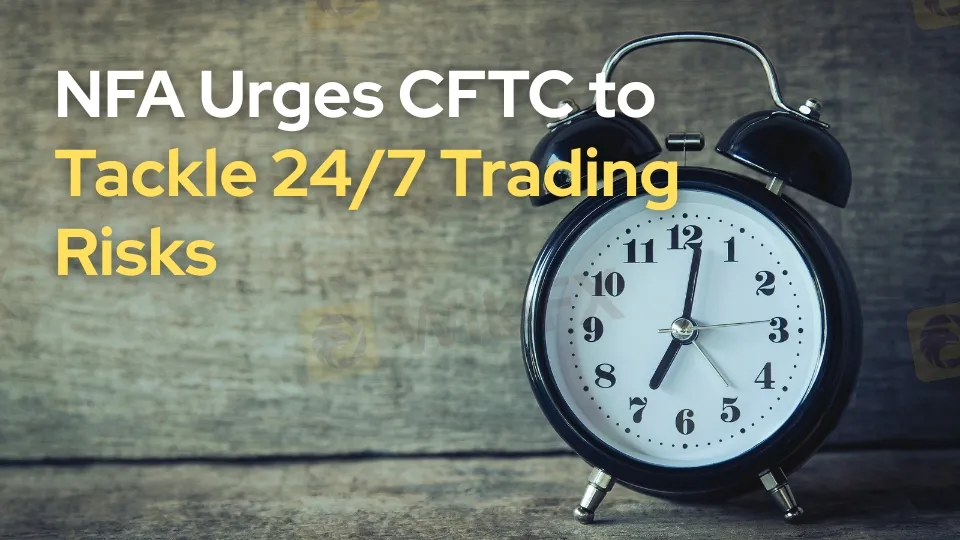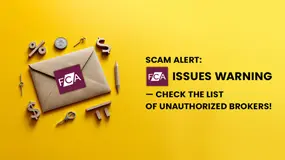简体中文
繁體中文
English
Pусский
日本語
ภาษาไทย
Tiếng Việt
Bahasa Indonesia
Español
हिन्दी
Filippiiniläinen
Français
Deutsch
Português
Türkçe
한국어
العربية
NFA Urges CFTC to Address Risks in 24/7 Derivatives Trading
Abstract:The NFA advises the CFTC to reassess regulations and risk disclosures to safeguard retail investors amid the shift to 24/7 derivatives trading.

The National Futures Association (NFA) recently shared its thoughts with the Commodity Futures Trading Commission (CFTC) about the challenges of 24/7 trading on platforms like designated contract markets (DCMs) and swap execution facilities (SEFs). The NFA wants the CFTC to update its rules to better handle the risks that come with trading that never stops, especially for everyday investors and futures commission merchants (FCMs).
The NFA points out that constant trading brings new dangers that current CFTC rules might not cover well. For example, people who don‘t trade all the time could lose money or have their positions closed because of wild market swings over the weekend. Even those who trade often need clear warnings about the special risks of a market that’s always open. The NFA says everyone in the market, whether they trade a lot or a little, needs to know how round-the-clock trading could affect them.
One big issue the NFA raises is the term “business day” in the CFTC‘s Part 1 rules, which guide how FCMs work with customers. Right now, a business day doesn’t include weekends or holidays, which doesn‘t make sense for a market that runs 24/7. For instance, rules say FCMs must send daily trade updates, but they don’t have to do this on weekends because of the “next business day” wording. This could hide serious problems, like an FCM‘s money troubles if risks pile up when markets are open but it’s not a “business day.”

The “business day” term also messes with how FCMs figure out their capital. These calculations, which look at charges and deductions based on when things happen, dont line up with a market that never closes. Without changes, FCMs might struggle to follow rules and keep their finances clear on weekends or holidays.
The NFA also wants the CFTC to check if its risk management rules for FCMs are strong enough for 24/7 trading. Theyre worried about risks like credit issues, market ups, and downs, problems moving collateral, tech glitches like system updates, and other operational hiccups that could mess up trading platforms or block customer access. The NFA urges the CFTC to make sure current rules can handle these problems or update them to keep everyone safe.
To keep things under control, the NFA suggests a full review of Part 1 rules to make sure they work for nonstop trading. This means checking customer protections and making sure FCMs can stay open and honest, even on weekends. The goal is a set of rules that fits todays fast-moving markets while keeping investors safe.
As markets shift to being open all the time, the NFA‘s comments highlight the need to update rules to match. By fixing gaps in warnings, rule-following, and outdated terms, the CFTC can better shield everyday investors and FCMs in a 24/7 world. The NFA’s ideas aim to build a stronger, clearer market for everyone involved.

Disclaimer:
The views in this article only represent the author's personal views, and do not constitute investment advice on this platform. This platform does not guarantee the accuracy, completeness and timeliness of the information in the article, and will not be liable for any loss caused by the use of or reliance on the information in the article.
Read more

AssetsFX Scam Alert: 5 Troubling Signs
Forex trading has become a critical game now because of advancements in technology. Due to this Unfortunately, scam brokers have also entered in the Forex market. Therefore, you need to stay alert. This article aims to warn all traders and investors. Read carefully and stay aware.

Forex4Money: Where Your Money Goes In, But Never Comes Out!
Discover how Forex4Money traps investors with fake profit promises and blocked withdrawals. Read real complaints and protect yourself from this unregulated forex scam.

What are Indian Traders saying about MINTCFD?
MINTCFD is an India-based broker. It's important to note that independent watchdogs have issued scam alerts against the broker. They label MintCFD as risky and possibly fraudulent. In this Article, we will tell you the red flags of MINTCFD to protect your money

Scam Alert: FCA Issued Warning! Check the List of Unauthorized Brokers Below!
Attention Traders! Never ignore a warning from a trusted authority like the UK’s FCA. If you do, you could risk losing your money. Check the list below of Scam forex brokers to protect yourself.
WikiFX Broker
Latest News
Euro zone inflation holds steady at higher-than-expected 2% in July
Forex Success Stories: Lessons You Can Use to Win
Scam Alert: FCA Issued Warning! Check the List of Unauthorized Brokers Below!
FCA Forex Trading Regulations Explained – What Every Trader and Broker Must Know
FIBO Group: A Closer Look at Its Licenses
Making Money with Forex Weekend Trading
Interactive Brokers Expands Forecast Contracts to Europe
Robinhood Gains 2.3M New Accounts, Platform Assets Close to $280B
CVS shares pop on earnings beat and outlook, as retail pharmacy and insurance units improve
CNBC's Inside India newsletter: Why an India-U.K. trade deal does not make U.S.-India agreement any easier
Currency Calculator


